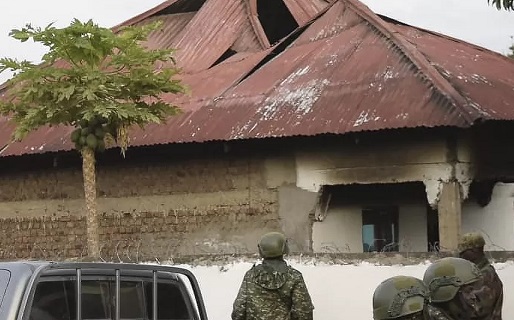Around 40 people, mostly pupils, have been killed at a school in western Uganda by rebels linked to the Islamic State group (IS).


A further eight people remain in a critical condition after the attack on Lhubiriha secondary school in Mpondwe.
Boys staying in dormitories are among the dead. Several others, mostly girls, have been abducted, authorities say.
The Allied Democratic Forces (ADF) - based in the Democratic Republic of Congo (DRC) - have been blamed.
The attack happened at around 20:30 GMT on Friday at the school in the Kasese district in western Uganda.
Over 60 people are educated at the school, most of whom live there.
Some five suspected ADF rebels carried out the attack, burning the school buildings and looting the food store.
Some of the boys were burnt or hacked to death, Maj Gen Dick Olum from the army told the media.
UPDF Soldiers are pursuing the ADF insurgents towards the DRC’s Virunga National Park - Africa’s oldest and largest national park which is home to rare species , including mountain gorillas.
Militias including the ADF also use the vast expanse, which borders Uganda and Rwanda, as a hideout.
The attack on the school, located less than two kilometres (1.25 miles) from the DRC border, is the first such attack on a Ugandan school in 25 years.
In June 1998, 80 students were burnt to death in their dormitories in an ADF attack on Kichwamba Technical Institute near the border of DRC.
More than 100 students were abducted.
The ADF was created in eastern Uganda in the 1990s and took up arms against long-serving President, Yoweri Museveni, alleging government persecution of Muslims.
Muslims make up almost 14% of the Ugandan population, though the Ugandan Muslim Supreme Council estimates the figure is closer to 35%.
Some members of the Ugandan Muslim community say they face discrimination in public life, including in education and the workplace.
After defeat by the Ugandan army in 2001, the ADF relocated to North Kivu province in the DRC.

ADF Commander Jamal Mukulu.
The group’s principal founder , Jamil Makulu , was arrested in Tanzania in 2015 and is in custody in a Ugandan prison.
ADF rebels have been operating from inside the DRC for the past two decades.
Makulu’s successor, Musa Seka Baluku, reportedly first pledged allegiance to the Islamic State group in 2016, but it was not until April 2019 that IS first acknowledged its activity in the area.
Islamic State as a group has been mostly defeated, though there are significant numbers of IS-affiliated militant groups across the Middle East and Africa.
After years of not operating openly in Uganda, the ADF was blamed for a series of attacks in late 2021 including suicide bombings in Uganda’s capital Kampala .

